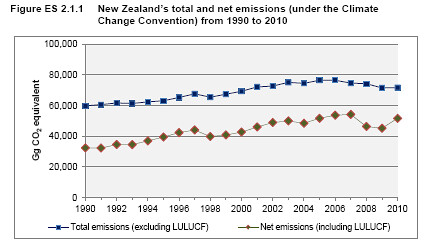The Ministry for the Environment has quietly released its latest inventory report [PDF]. The headline data is shown in the graph below (stolen from page vi):
Gross emissions have remained fairly static. Meanwhile, removals have dropped substantially, meaning a rise in net emissions. We're still well under our Kyoto cap, but its troubling.
Meanwhile, the government also admits that it has basically been fiddling the numbers and engaging in creative accounting in these reports:
New Zealand’s initial assigned amount under the Kyoto Protocol is recorded as 309,564,733 metric tonnes CO2 equivalent (309,565 Gg CO2-e). The initial assigned amount is five times the total 1990 emissions reported in the inventory submitted as part of New Zealand’s Initial Report under the Kyoto Protocol. The initial assigned amount does not change during the first commitment period (2008–2012) of the Kyoto Protocol. In contrast, the time series of emissions reported in each inventory submission are subject to continuous improvement. Consequently, the total emissions in 1990 as reported in this submission are 3.5 per cent lower than the 1990 level of 61,912.9 Gg CO2-e, which was estimated in 2006 and used in the initial assigned amount calculation.Yes, "methodological improvements" made after the amount was fixed has allowed the government to bank a free 3.5% reduction in reported emissions, without actually doing anything in reality. But while such accounting tricks may allow them to reduce our liability, you can't fool the atmosphere like this, and so they don't do anything to actually solve the problem. Only real emissions reductions will do that.
The government also released its annual net position report, which shows a 10% improvement in our expected Kyoto surplus, again due to methodological changes:
Removals from afforestation, reforestation and deforestation under the Kyoto Protocol are now projected to be 85.8 Mt CO2-e over 2008–2012. This is 3.0 Mt CO2-e higher than projected last year. This increase is primarily due to improvements to our estimates of the rates at which forests sequester carbon.Looking back through my past analysis of previous Net Position Reports, every significant shift in our position is due to such changes. Actual policy doesn't seem relevant; what matters is accountancy. Again, I have no doubt that these changes will withstand the scrutiny of international peer review. At the same time, the fact that none of them affect the 1990 baseline makes the whole thing a giant fiddle, an exercise in Enron accounting. We - and the environment - deserve better form our politicians than that.






